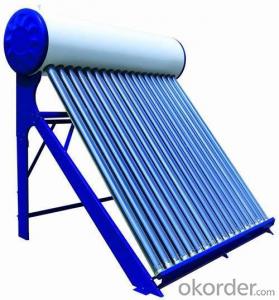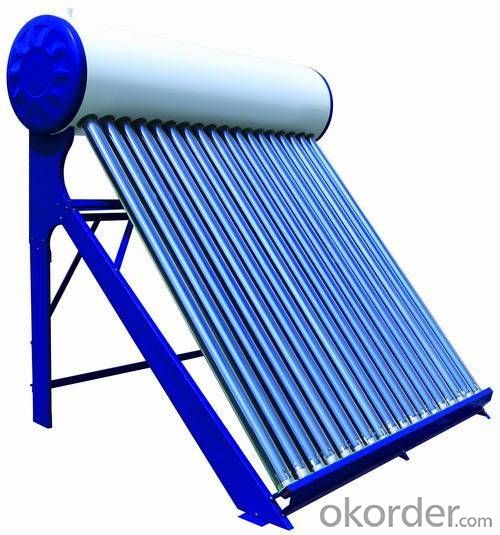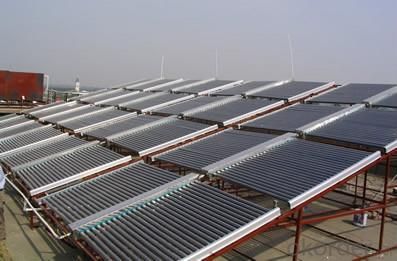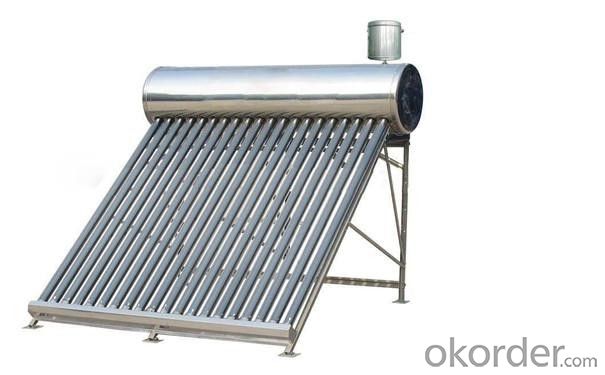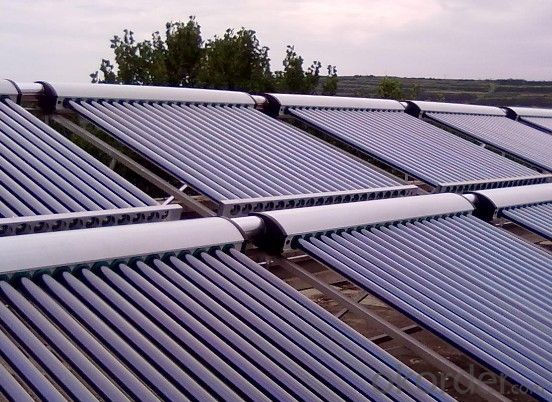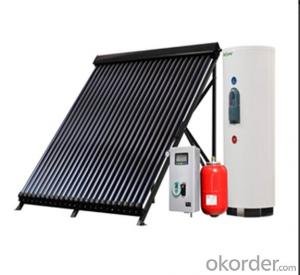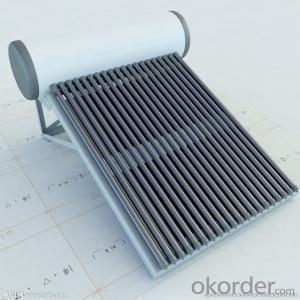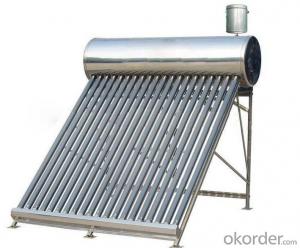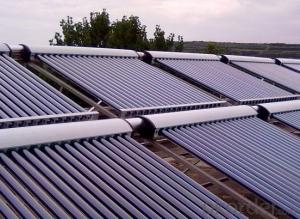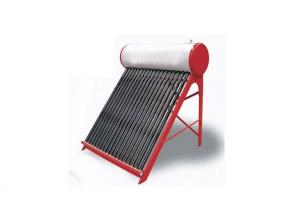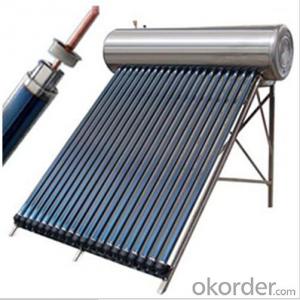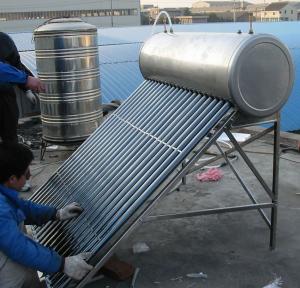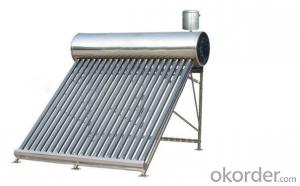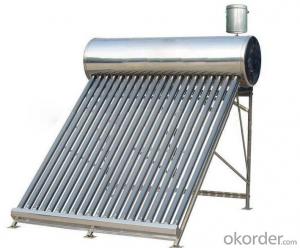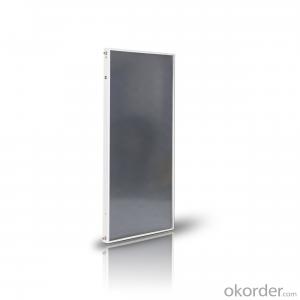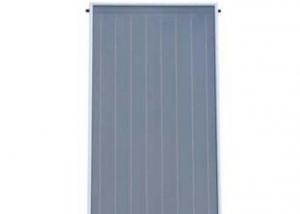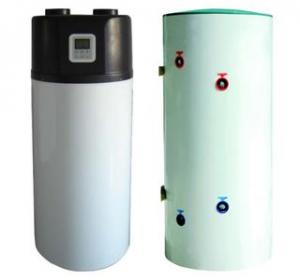Solar Water Heater Cost - Integrated Unpressurized Solar Hot Water Heater
- Loading Port:
- China main port
- Payment Terms:
- TT OR LC
- Min Order Qty:
- 10 set
- Supply Capability:
- 10000 set/month
OKorder Service Pledge
OKorder Financial Service
You Might Also Like
Introduction of Non-Pressure Solar Water Heater:
Non-pressure Solar Heater is one of the most economical solar water heating device with pretty high efficiency at the same time. It consists of hot water storage tank, solar vacuum tubes with mouth plug in storage tank, and bracket supporting tank and tubes.When cold water in evacuated tubes is heated with solar irradiation, as the specific gravities of hot water and cold water are different, hotter water goes upward to storage tank and colder water goes downward to glass tubes. through this continuous circulation, the cold water in storage tank will be gradually heated till sunset.
Solar water heaters working principle
1. The solar collector absorbs solar energy and transmits it to the solar water heater tank through circulation
2. When the temperature of the collector reaches the set value, the controller starts the circulation pump automatically
3. The circulation pump makes heat-conducting liquid circulate automatically
4. The heat-conducting liquid transfers heat to water by lower heat exchanger in the water tank.
5. When the temperature difference between solar collector and heat pipe solar water heaters tank doesn't reach the set value, the circulation pump will be shut automatically
6. In case the temperature of the water tank does not reach Tmax, Electric Heating Element will start to work automatically
Solar water heaters working station component:
1. Operating screen
2. Manometer
3. Pump speed adjust switches
4. Temperature difference circulation pump
5. Flow rate indicator
6. Return circuit connector
7. Safety valve
Solar water heaters specification:
Description | solar water heaters |
Material of out manifold | 0.55mm thickness color steel/ fluorine carbon steel |
Material of inner tank | Food grade 2.0 mm thickness SUS304 stainless steel |
Tank insulating layer | 40mm 45kg/m³ high-density polyurethane foamed |
Inlet and outlet hole | Male G1'' |
Max pressure | 0.6 Mpa |
Solar collector tube | 3.3 Borosilicate glass with N/Al coating |
Thickness of glass tube | 1.6mm |
Vacuum tube tightness | P≤0.005 Pa |
Absorption | as=0.93-0.96 (AM1.5) |
Emission ratio | εh=0.04-0.06 (80C±5C) |
Idle sunning property parameters | Y=220~260m2.C/KW |
Average heat loss coefficient | ULT=0.6~0.7W/(m2.C) |
Bracket: | 2.0mm thickness aluminum alloy |
Tank weight | 75KGS |
Tank size | 560mm Dia x 1810mm Height |
Tank capacity | 300L |
Solar collector | 2pcs 58x1800x15tube solar collector |
Absorber area | 2.811 m² |
Working station | SP116 working station |
Heat exchanger length | Upper:12m, Underside:18m |
Solar water heaters details show:
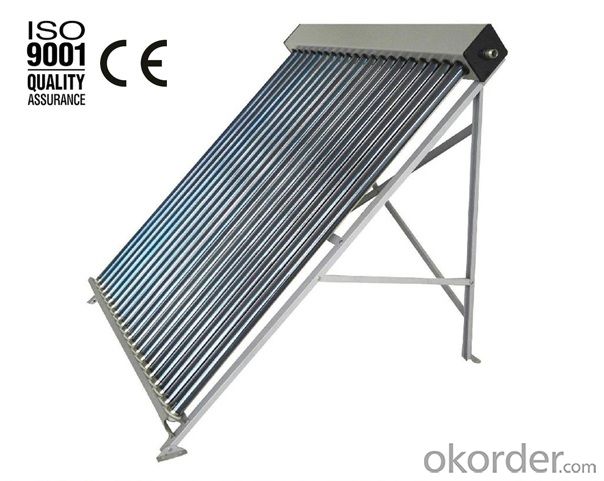
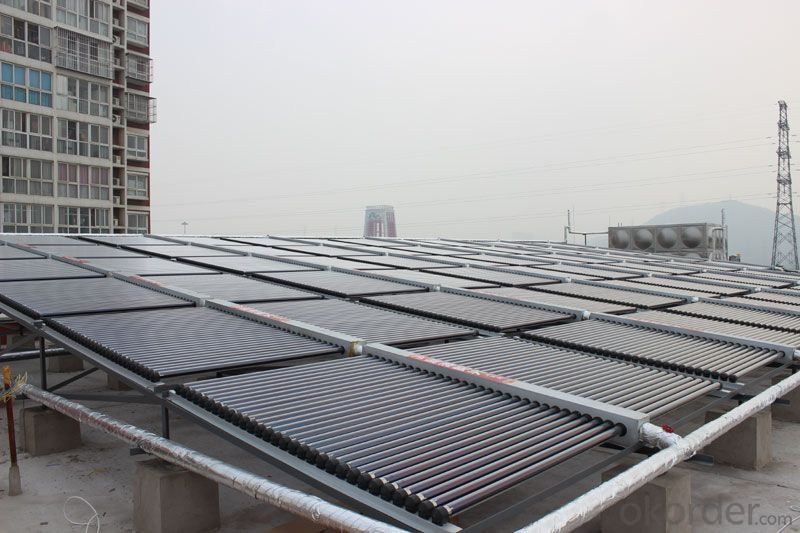
Benefits of this kind of solar water heaters:
1. Prolong the life of your existing water heater
2.Costs less than an electric, gas or oil water heater
3.No maintenance required
4.Lasts longer than a traditional hot water heater
5.Reduce your water heating costs
- Q: Can a solar water heater be used in areas with high levels of water contamination?
- Yes, a solar water heater can be used in areas with high levels of water contamination. Solar water heaters primarily use the sun's energy to heat water, and they do not directly affect the quality or purity of the water. However, it is essential to ensure that appropriate water treatment methods are in place to address the contamination issue before using the water for drinking or other purposes.
- Q: Can a solar water heater be used in areas with limited oil pipelines?
- Yes, a solar water heater can be used in areas with limited oil pipelines. Solar water heaters utilize energy from the sun to heat water, eliminating the need for oil-based heating systems. They are independent of oil pipelines, making them a suitable and sustainable alternative in such areas.
- Q: Classification of solar water heaters
- In terms of its structure, can be divided into the following categories:1 from the heat collection part:1 glass vacuum tube solar water heaterThe utility model can be divided into a whole glass vacuum tube type, a heat pipe vacuum tube type, a U type tube vacuum tube type / vacuum tube heat collection and heat storage integration type. The utility model relates to a full glass vacuum tube type, which has the advantages of safety, energy saving, environmental protection and economy. Especially the solar water heater with an auxiliary electric heating function, which by the solar energy, supplemented by the way of using energy to the solar water heater all-weather normal operation, the ambient temperature is low efficiency is still relatively high. The disadvantage is that the volume is relatively large, the glass tube is fragile, easy to scale the pipe scale, can not be operated under pressure.
- Q: Can a solar water heater be used in areas with high levels of electromagnetic radiation from communication towers?
- Yes, a solar water heater can be used in areas with high levels of electromagnetic radiation from communication towers. The electromagnetic radiation emitted by communication towers does not interfere with the functioning or efficiency of solar water heaters. These two technologies can coexist without any negative impact on each other.
- Q: Solar energy inside the house was old sin, the bottom of my heart despise this product. Two years to repair three, but have to use ah, see the winter, the electric heating rod is broken, then the agent of the solar energy has long been closed to run, and call to other home, said to be more than and 300. I look at the Internet, it will be able to buy 30-50 yuan. So I want to repair. But up to the roof dumbfounded, electric rods will not be demolished. Who help, tell how to dismantle the electric heating rod. I promise I won't be able to buy a solar water heater in the future! Mmm ~ ~
- There are two kinds of electric heating rods, like we use incandescent bulbs, a bayonet, a kind of silk mouth, first look at what kind of home,
- Q: Can a solar water heater be used in areas with low sunlight?
- Yes, a solar water heater can be used in areas with low sunlight, but its efficiency may be reduced. The system will still be able to generate some amount of hot water using available sunlight, but it may take longer to heat the water or produce less hot water compared to areas with higher sunlight availability.
- Q: What is the average energy savings from using a solar water heater?
- The average energy savings from using a solar water heater vary depending on various factors such as climate, usage patterns, and the efficiency of the system. However, studies have shown that on average, solar water heaters can reduce energy consumption for water heating by 50-80%.
- Q: Solar water heater after a month without water, will be bad
- No, as long as the solar water heater vacuum tube and water tank, the stent is not bad to work properly! Just note that when used again, if the water in the water, remember the sun when the water, because this will cause the explosion of the vacuum tube!For more products and information please Baidu Jiang Yue Mall for viewing, the most complete solar energy air machine, accessories and so onRecommendation: "Dr. Sun" in the solar energy, solar (without water level sensor and solenoid valve), rainy weather heating and hot water utilization rate is fast, and the customer service rate is greatly reduced, which saves time and energy saving. This type of solar energy than ordinary single warehouse in the absence of the sun heating time is only 20-30 minutes, and a single warehouse needs 2-3 hours!
- Q: The above shows the temperature has been more than and 50, to take a bath when boiling water, only cold water, hot water is basically not a, the water temperature control handle to position the red water shake is very small, basically no is good before, just a few days ago there was no sun, the temperature of the water that has been more than ten degrees today is not easy to have the sun, but the water boiling water is very small, their blind by the instrument above twist, I would like to ask that what pressure Sheung Shui what meaning, what is the effect of it
- New solar customers to understand solar instrument was also not detailed. They will be chaos by the instrument above the twist, I notice you never mind: (it is best to read the instrument manual, according to the manual practice)
- Q: How does the angle of the solar panels affect the efficiency of a solar water heater?
- The angle of the solar panels directly affects the efficiency of a solar water heater. The optimal angle for the solar panels is dependent on the latitude of the location. If the angle is too steep or too flat, it can result in less efficient absorption of solar energy. The correct angle allows the panels to capture the maximum amount of sunlight, optimizing the efficiency of the solar water heater.
Send your message to us
Solar Water Heater Cost - Integrated Unpressurized Solar Hot Water Heater
- Loading Port:
- China main port
- Payment Terms:
- TT OR LC
- Min Order Qty:
- 10 set
- Supply Capability:
- 10000 set/month
OKorder Service Pledge
OKorder Financial Service
Similar products
Hot products
Hot Searches
Related keywords
